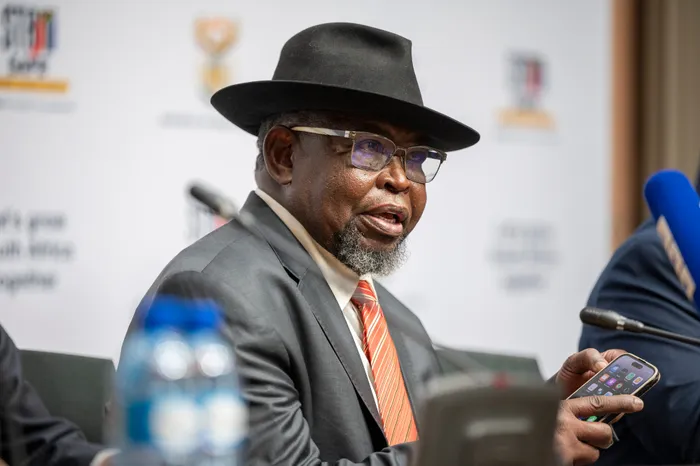Concerns grow over South Africa's Budget consensus ahead of looming deadline
ECONOMY

Concern is spreading about whether a consensus will be reached for Finance Minister Enoch Godongwana’s Budget to be passed as the deadline of next Wednesday 2 April looms.
Image: Armand Hough / Independent Newspapers
Concern is spreading about whether a consensus will be reached for Finance Minister Enoch Godongwana’s National Budget to be passed as the deadline of next Wednesday April2 looms. The ANC and the Democratic Alliance remain at odds over a tabled 0.5% Value Added Tax (VAT) increase on March 12. Labour federation Cosatu, economists, Action SA, and civil society are concerned about the impact of the Budget not being passed.
Cosatu's parliamentary counsellor, Matthew Parks, said that it’s critical that Parliament passes the Budget. “We cannot afford for this not to happen as it would then threaten the state’s ability to fulfil its constitutional obligations, including providing social grants and public services. This needs to happen on April 2, according to the legislative framework."
Parks added that there's some space in case this doesn’t happen, but South Africa would not want to enter such dangerous territory.
“There are many progressive provisions for which Cosatu has campaigned, included in the Budget to rebuild the state, stimulate growth, create hubs, protect the poor, and improve tax collection. We are opposed to VAT and the failure to adjust Personal Income Tax brackets and have tabled progressive revenue and expenditure alternatives to this to Parliament and Treasury," he said.
Athol Trollip MP, ActionSA Parliamentary leader, said the ongoing deadlock in passing the Budget is both unprecedented and an indictment of a Government of National Unity that lacks a coherent plan.
“The consequences of this failure are severe, as it risks pushing the country into a constitutional crisis if no consensus is reached on the passage of the Budget. As a constructive opposition, ActionSA is working toward engaging other political parties in a process that ensures a responsible and solution-driven approach to the Budget,” Trollip said.
Trollip added that ActionSA's priority is to mitigate the risk of a fiscal crisis by pursuing all possible avenues for consensus and stability.
“That said, we remain clear in our rejection of any VAT and stealth tax increases and are not prepared to support a Budget that doesn’t pursue fiscal discipline and economic growth,” he said.
Waldo Krugell, an economics professor at North-West University, said, "If the Budget is not approved (by April 2), spending will continue in line with the Medium-Term Budget Policy Statement (MTBPS). That would exclude the new spending proposed in the 2025/26 Budget. So no R370 SRD (Social Relief of Distress) grant, and no money for those teaching and health care positions in frontline services. The MTBPS also budgeted for a 4.5% wage settlement, not the 5.5% that was agreed to later. It will be very disruptive and to the detriment of service delivery. The political fallout for the GNU will be significant.”
Efficient Group chief economist Dawie Roodt said nobody knows exactly what is going to happen if the Budget is not passed.
“There are a few things we are certain of the Budget is like a law. There are four pieces of legislation that need to be approved by parliament. One or two will be easy, like the fiscal framework, which will be approved, but tax changes will be much more difficult. A VAT increase is a reality and it will be passed on May 1,” Roodt said.
“However, I do think the politicians will come together and a Budget will be passed eventually,” he added.
University of KwaZulu-Natal political science lecturer Zakhele Ndlovu said it is very unfortunate that the GNU is struggling to reach consensus on the Budget.
“The next step for the GNU partners is to continue negotiations until they reach an agreement. It was always going to be very difficult for political parties that don't see eye to eye on just about everything to work together. Maybe it is time for the DA and the IFP to insist on reducing the bloated executive branch, cutting spending on the wage bill, and other areas.”
Siyanda Baduza, a researcher in the basic income project at the Institute for Economic Justice (IEJ), saidas far as they understand, non-consensus on the Budget at this point will not affect the payment of grants to recipients. “Those will continue as normal, including for the SRD grant, where the new regulations have been released for public comment, although without any substantive changes to any of the regulations, value, or means test.”
Baduza added that non-consensus does mean, however, that there won't be any increase in the value of the grants, as these were contingent on the Budget passing.
“Furthermore, as Treasury has made it clear, the above-inflation increases that were proposed for all the grants (except the SRD) were premised on a VAT increase. If the VAT increase doesn't pass, it would likely, unfortunately, mean that these above-inflation increases won't be realised,” Baduza said.
BUSINESS REPORT
Related Topics: